Quicksilver Messenger Service and Nicky
Hopkins
Albums reviewed on this page: Quicksilver
Messenger Service, Happy Trails, Shady
Grove, Just for Love, What
About Me,
Tin Man Was a Dreamer, No
More Changes.
More consistent than the Airplane
and more varying than the Dead, but with the same instrumental
prowess, Quicksilver Messenger Service were a first tier Frisco band
that has been lost in the shuffle. In America the blame is easy
to fix - the group had only one single that approached being a hit,
"Fresh Air", and it only cracked the Top 50. Classic
rock programmers tend to ignore the group's string of four albums in
the Top 30, from Happy Trails to What About Me.
As for the band itself, they say you can never go back, but that is
exactly what Dino Valenti did. During the group's really early
days he got busted for drugs and wound up in prison. Music and
drugs seem to be the common things in his life, as he previously had
sold song rights to pay for legal defense. With Valenti out of
the way, Quicksilver focused on the intertwined guitars of Gary
Duncan and John Cippolina, with David Freiberg on bass and Greg
Elmore on drums. The band focused on acid-rock and folk, with
an interesting taste in instrumental passages. Cippolina's
guitar has a distinct ringing tone which gives it a unique sound.
Of course, it couldn't last, as Duncan soon left to join a freed
Valenti in some project that proved to be a non-starter. In
what has to be the most inspired move around, the band coaxed British
session pianist vet Nicky Hopkins into the fold, and the move paid
dividends immediately on Shady Grove. But then Valenti
and Duncan both returned and everyone played together for a
while, with Valenti taking charge and scoring the aforementioned
almost hit "Fresh Air". But listening to Just for
Love and What About Me it is pretty obvious that Valenti
really crowded the group, and it is no surprise that Cippolina,
Freiberg and Hopkins all left after one more album. After one
album with scrubs the band called it quits. Cippolina formed a
group named Copperhead, which released one album, while Freiberg went
over to Jefferson Airplane. Hopkins went
back into session work, and had an unsuccessful solo career.
God knows what Dino Valenti did. Probably more drugs.
In
the American game of baseball there is currently the notion
circulating of a level of playing referred to as "replacement
level." The idea is that those people who perform at or
under this level can easily be replaced by someone who is at
"replacement level" who probably costs a lot less.
This is somewhat analogous to the position of sessionmen in rock
music. If a member of your band is not playing up to
"replacement level" (or in the case of John's Children, the
entire band) simply have session people take their place on the
recording. This oversimplifies things, but there were a good
number of people who were good enough (i.e., "replacement
level") to make their living by filling an often anonymous
role. The best of them, people like the Keys-Horn-Price horn
section, Jimmy Page and Nicky Hopkins, were often far above
"replacement level" and instead of simply filling a role
they augmented recordings musically (as opposed to simply
sonically). Essentially, the best session guys were more than
just spare parts, and Nicky Hopkins was the premiere session
keyboardist in the late 60s and 70s. His style is mainly
R&B/rock, but he could handle all sorts of roles - from a Kinks'
harpsichord session to a loopy Giles,
Giles and Fripp session to a pounding Stones one. He was in
the Jeff Beck Group, he was in
Quicksilver Messenger Service, and he turned down a chance to join
the Rolling Stones. His own small output is terribly uneven,
but Tin Man Was a Dreamer is worth checking out - along the
lines of the whole post-Delaney & Bonnie countrified rock sound.
Personnel: John Cipollina (guitar), Gary Duncan (guitar), David Freiberg (bass, vocals), Greg Elmore
(drums), Dino Valenti (guitar, vocals). Valenti imprisoned before the band recorded.. Duncan
left after Happy Trails, replaced by Nicky Hopkins (piano).
Duncan then returned with Valenti in 1970.
Cipollina, Freiberg and Hopkins quit mid-1971.
Band ended 1973.
Nicky Hopkins: Revolutionary
Piano (1966)
I
don't think I'll be seeing this. Ever. EZ listening material,
not revolutionary.
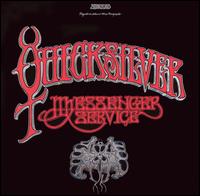 Quicksilver
Messenger Service (1968), ****
Quicksilver
Messenger Service (1968), ****
Quicksilver
had been around the San Francisco scene for a few years before
recording their eponymous debut. The
straightforward production is rather surprising given
when it was recorded, the band perhaps having learned a lesson from
some other
local groups. Instead of
hazardous psychedelia, QMS is a guitar-led acid-folk album
that stays focused while it chugs along (the imprisoned Valenti's
sole contribution "Dino's Song" is a good example).
As for musical influences, QMS includes everything up to the
kitchen sink - folk, jazz, Spanish classical, country, blues all
thrown together, giving the band a diverse sound not unlike Love's
Forever Changes, but much more electric guitar based.
Lead guitarist John Cipollina coaxed a unique ringing twang out his
instrument ("Pride of Man"), giving Quicksilver an
identifiable sound, but the entire is tightly knit (the early
country-rock "Too Long"). The longer tracks are of a
lesser quality, but barely. Cipollina and Duncan trade off
frequently, which creates some good moments, such as the instrumental
"Gold and Silver": the inevitable "Take Five"
based song transferred into 6/8, which could have appeared on This
Was.
The other example is the
slightly sprawling "The Fool", which sounds like the
soundtrack to a Western (at one point a guitar is wah-wahed into
sounding like a rattlesnake, while occasionally a whip is heard),
before panning out with some fairly lame 60s lyrics. Otherwise,
everything on QMS is extremely well done. Energetic,
entertaining and featuring some strong guitar work. In good
Frisco style, who did what is not shown. Produced by Nick
Gravenites, Harvey Brooks, and Pete Welding.
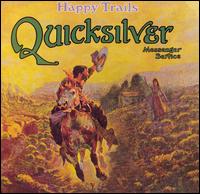 Quicksilver
Messenger Service: Happy Trails (1969), ***
Quicksilver
Messenger Service: Happy Trails (1969), ***
The title does
not reveal this, but Happy Trails was mostly recorded live.
It is a wrongful game of catch-up: the dated experimentalism
Quicksilver successfully avoided on their debut is present. The
first side is the "Who Do You Love Suite", a
rendition of the Bo Diddly tune divided into instrumental solo
sections. Thankfully, the
band dropped Diddly's infamous rhythm fairly early on, and stretch
out into some bluesy/jazzy soloing. At its core, however, the
suite collapses first into harmonics (which is, well, unusual)
and then into Freiberg's violin scrapings while the crowd noise is
viciously panned ("Where Do You Love"). Back in the
studio, Duncan wrote another track that sounded like a Western
soundtrack (the instrumental "Calvary"),
which is structured as the suite's inverse; that is, it has a
worthwhile song portion in the middle, but is bookended by abstract
noises and instrumental diddling. The other live tracks show
them to be an excellent hard rocking San Francisco group ("Maiden
of the Cancer Moon" and Diddly's "Mona"). Only
their instrumental craftsmanship saves this album.
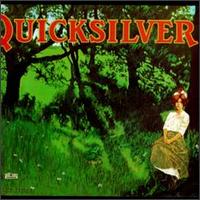 Quicksilver
Messenger Service: Shady Grove (1970), ***1/2
Quicksilver
Messenger Service: Shady Grove (1970), ***1/2
Their first
album with Nicky Hopkins, and his impact is enormous. Of
course, I should hope so, as he replaced Duncan,
who was Quicksilver's main songwriter. But a change of musical
scenery (diffusing the musical focal point away from the guitar) did
everyone good, and producer Nick Gravenites stepped in to co-write
with group members. Do not be deterred by the first two songs
on this album, which feature iffy vocals and are not astounding.
The third, "3 or 4 Feet From Home", is a blues stomper with
guitar and piano both wailing away. Hopkins
is the center of the next two tracks, "Too Far"
and "Holy Moly", and they are even better. The former
is a real classic, and the latter is also a good time, despite
similarites with Donovan's "Atlantis". Shady
Grove's back
side is more experimental, with Cipollina more content to play around
with weird effects than actually soloing (the coda to "Joseph's
Coda"), and some traditional (the nice "Words Can't Say").
But the real stuff is the sad "Flashing Lonesome", with
interesting interplay between Hopkins and Cipollina. Finally,
Hopkins' contributed the uncharacteristic (for a West Coast band)
"Edward (The Mad Shirt Grinder)", a faintly jazzy keyboard
masterpiece. Just listen to the rest of the band try to keep up
with him! If you like piano-based rock songs (and I don't mean
bastards like Billy Joel) Shady Grove delivers, just don't
expect Dead or Airplane-like
material. (Capitol SM-391 LP)
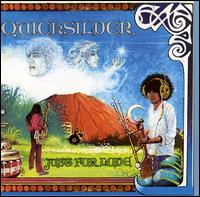 Quicksilver
Messenger Service: Just for Love (1970), **
Quicksilver
Messenger Service: Just for Love (1970), **
Like a good
Mafia family, Quicksilver welcomed back Dino Valenti after he paid
his debt to society. He immediately became the group's central
figure, which was unfortunate. It was not an ideal match; Valenti had
been a folk singer/songwriter in the pre-Byrds era, while
Quicksilver's talents were more instrumental and loose. Thus,
Quicksilver became a vehicle for Valenti's physical and musical
voices. His physical voice is a few shades of annoying-- an
offputting nasal twang that cuts through the air. Just for Love's
production only exacerbates this; the band moved to a remote Hawaiian
location to record the album, and it sounds like it was recorded in
the Hollywood Bowl without microphones. This results in obvious
mixing problems, and the band sounds dispersed and distant. This in
turn makes Valenti's vocal dominance all the more scary--he must have
had quite the pair of lungs. His musical voice dominates the album,
leading Quicksilver into latin-jazz ("Fresh Air" or the
languid "Gone Again"), New Age instrumentals ("Wolf
Run") or needlessly
long bluesy compositions ("The Hat" with some
over-the-top vocals or "Gone Again"). Sure, the rest of the
band might have offset this with their usual wizardry, and they may
have done so, except they are not really audible. Cippolina gets one
nice instrumental track ("Cobra"), but that is about it.
Two of the shorter tracks are more tolerable - the blues-rock of
"Freeway Flyer" and the Santana-like "Fresh Air"
which became a semi-hit. The song's succees seems more the product of
dumb luck than any particular talent, although it is the one track
where the guitars are the clearest. Somehow the band managed to
squander the talents of Duncan, Cippolina and Hopkins on this folly.
Under-rehearsed, under-recorded, and underwhelming.
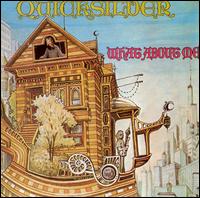 Quicksilver
Messenger Service: What About Me? (1971), **1/2
Quicksilver
Messenger Service: What About Me? (1971), **1/2
Only partially
composed of Hawaiian wilderness tracks, and Quicksilver benefitted
from the return to a real studio. Valenti's dominance over
Quicksilver' direction continued (the Santana-like
title track or the cocktail jazz of "All In My Mind" are
the most successful examples) with only a few nods towards their
former style ("Baby Baby"), and the execution is poor on a
few fronts. Valenti really sounds like a marijuana cowboy - his
vocals are constrained, twangy and really laid back. His songs
are much more conventional in construction than on Just for Love,
but the band does not use the provided space to stretch out,
resulting in the distinct feeling that many of the tracks have been
padded out in length (the spacey folk "Long Haired Lady",
"Call On Me"). It also does not help that Cipollina,
Freiberg and Hopkins were only somewhat involved, although each
placed one song on
What About Me?, with Hopkins's "Spindrifter" being
yet another piano instrumental classic. Mark Naftalin
(ex-Butterfield Blues, Electric Flag) contributed piano on some
tracks and Duncan is credited with some bass. Percussionist
Jose Rico Reyes was also brought in and did a good job in places.
All in all, there are a few good spots, but the rest is just eh.
No credited producer.
Quicksilver Messenger Service:
Quicksilver (1971)
Cippolina,
Hopkins and Freiberg's last album.
Quicksilver Messenger
Service: Comin' Thru (1972)
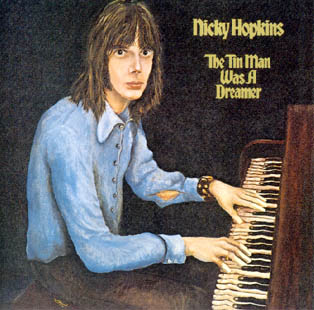 Nicky
Hopkins: Tin Man Was a Dreamer (1973), ***
Nicky
Hopkins: Tin Man Was a Dreamer (1973), ***
Hopkins' first
solo album is rather peculiar. It is not really a
singer-songwriter album, although many of the tracks are apparently
reflective of his life a session pianist. In fact, Hopkins sang
on only about half the tracks, with the expressive Jerry Williams
(aka Swamp Dogg, who also helped write some of the songs) handling
the rest. This makes Hopkins sound like a guest on his own
record, but that the role in which he always seemed the most
comfortable. Tin Man is mainly piano-rock,
alternating between orchestrated romantic numbers and more driven
boogie or down-home rock numbers. As a pianist Hopkins had a
distinctive style, but his voice was breathy and his range rather
limited. It works well on the sad-sack "The Dreamer"
which sounds like it could be from Kermit the Frog on Broadway,
and on the strong "Waiting For the Band". Out of the
Williams numbers "Banana Anna" is a boogie with the
vocalist occasionally shouting his way to a good time, and "Shout
It Out" is another strong "rock" number. On the
downside Hopkins's overly earnest vocals make it hard to determine if
"Lawyer's Lament" is poking fun or not. The
instrumental tracks are all decent, and the remake of "Edward"
adds in a wonderful Bobby
Keys sax break. Of course, the majority of the
people on session men - ranging from the famous (Keys-Horn-Price horn
section and Stones guitarist Mick Taylor), the usual faceless crowd
(Klaus Voorman, Chris Spedding, Ray Cooper), the future famous (Tubes
drummer Prairie Prince), to the mysterious (George O'Hara, or should
I say George Harrison, diddling around on slide). So, this
album is generally good, but it's never really clear as to who is in
charge - with Williams singing and Hopkins's piano not really
up-front a lot. Produced by Hopkins and David Briggs.
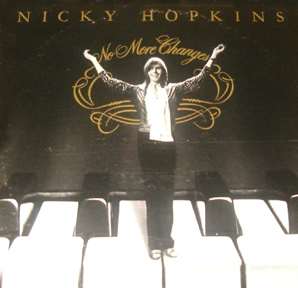 Nicky
Hopkins: No More Changes (1975), **
Nicky
Hopkins: No More Changes (1975), **
Oh dear.
Remember how I said Hopkins limited voice only worked in certain
situations? While not an
abysmal vocalist, on
No More Changes he went all out, and at his best sounds like Ronnie
Lane's bad side
("Refugee Blues"). Combine that with a
no-name backing band and the results are something strangely akin to
a misbegotten karaoke recording ("Wild You" or the vocally
frightening opener "Sea Cruise"). Whereas Williams
could sing and wrote a bunch of lyrics on the previous album, here
Hopkins relies on a couple of covers (among them Jackie De Shannon's
"Hanna", "Lady It's Time to Go") or his wife's
rather bland lyrical skills. Only once does he attempt to
recapture the sad aura of his last album ("No Time") and it
doesn't work that well. Nor are his instrumentals very
interesting - the exception, "The Ridiculous Trip", is
simply Tin Man's "Speed On" without lyrics.
The most bizarre thing of all is "Mornin I'll Be Movin' On"
which sounds faintly like disco. Overall, the album continues
his brand of slightly countrified piano rock, but not in a fun way.
The guilty parties (certainly "replacement level") are Eric
Dillion (drums), Rick
Wills (bass), David
Tedstone (guitar), and Michael Kennedy (guitar). Produced by
Hopkins, John Edwards and Mark Smith. (Mercury LP SRM-1-1028)
In case you
were wondering, if this had been two LPs it would have gotten half a
star lower.
Quicksilver Messenger Service:
Solid Silver (1975)
A
reunion record.
Gee it's awful,
waiting around, so back to the Music Page...
 Quicksilver
Messenger Service (1968), ****
Quicksilver
Messenger Service (1968), ****
 Quicksilver
Messenger Service: Happy Trails (1969), ***
Quicksilver
Messenger Service: Happy Trails (1969), ***
 Quicksilver
Messenger Service: Shady Grove (1970), ***1/2
Quicksilver
Messenger Service: Shady Grove (1970), ***1/2
 Quicksilver
Messenger Service: Just for Love (1970), **
Quicksilver
Messenger Service: Just for Love (1970), **
 Quicksilver
Messenger Service: What About Me? (1971), **1/2
Quicksilver
Messenger Service: What About Me? (1971), **1/2
 Nicky
Hopkins: Tin Man Was a Dreamer (1973), ***
Nicky
Hopkins: Tin Man Was a Dreamer (1973), ***
 Nicky
Hopkins: No More Changes (1975), **
Nicky
Hopkins: No More Changes (1975), **